

CEINAV – ACTIVITIES
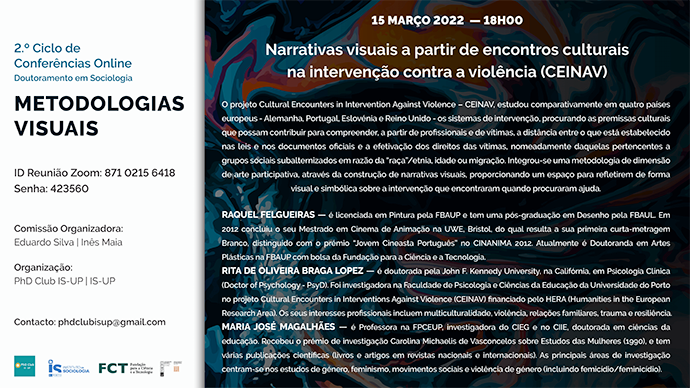
March 15th, 2022
The CEINAV Portuguese researchers were invited to participate in the 2nd cycle of online conferences organized by the PhD Club of the institute of Sociology of the University of Porto (IS-UP) in collaboration with the direction of the doctoral program of IS-UP. The PhD Club is formed by FCT doctoral fellowship recipients. The 2nd cycle of online conferences was named: “Visual Methodologies”. The PhD Club invitation had as basis the article: “Narrativas Visuais: arte participativa com mulheres e jovens vítimas de violência” publicado na revista Vista, nº1, de 2017.
The researchers started by making a summary of the scope and objectives of the CEINAV project. They then presented the methodology with the victims of violence, namely the interview process, construction of timelines and co-writing of narratives. The narratives from all the victims across the four countries of the project were then compiled in an international anthology of stories. Finally, the researchers presented the methodology of participatory art with the project participants. Lasly, the short film “Sendas” was exhibited. This short film was directed by the artist-researcher Raquel Felgueiras and co-produced by Filmógrafo and the Cine Club of Avanca. This short film was selected for various national and international film festivals and distinguished in the twentieth edition of the Avanca Festival with the award “Competição Avanca – Short film”.
The presentation was very well received by the conference participants who seemed particularly touched by the short film “Sendas”. The event ended with a questions and answers moment.
CEINAVers
CEINAVers in Freiburg presenting an Oral Presentation at the Annual Conference of the European Network on Gender and Violence (ENGV), between 17th and 19th July 2019.
In the photo: Carol Hagemann-White, Thomas Mysen, Ute Zillig, Cornelia Hellfferich e Bianca Grafe.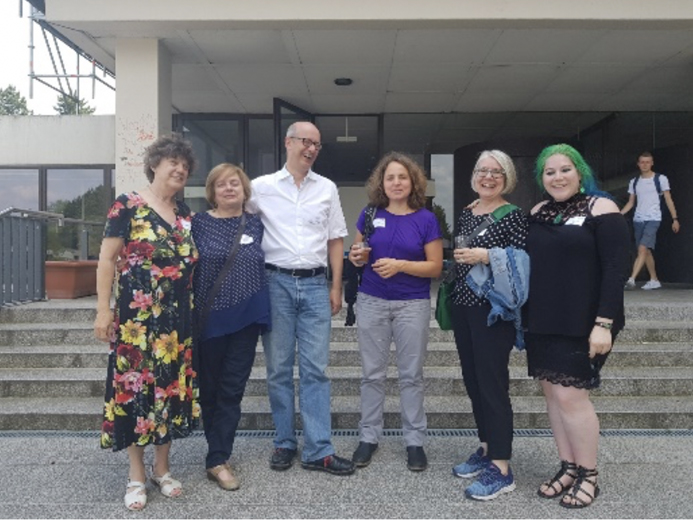
International Seminar “Gender, Sexuality and Violence: investigation experiences and intervention”
The International Seminar “Gender, Sexuality and Violence: investigation experiences and intervention” was held at Faculty of Psychology and Educational Sciences from the University of Porto on the 14thDecember 2016.
This seminar had the participation of academics and professionals of several countries including Portugal, Brazil and Germany. In this event it was also presented a book in Portuguese with the title “What is the future of sexuality in law?”, with an oral presentation an de-poster session.
For detailed program please visit HERE.
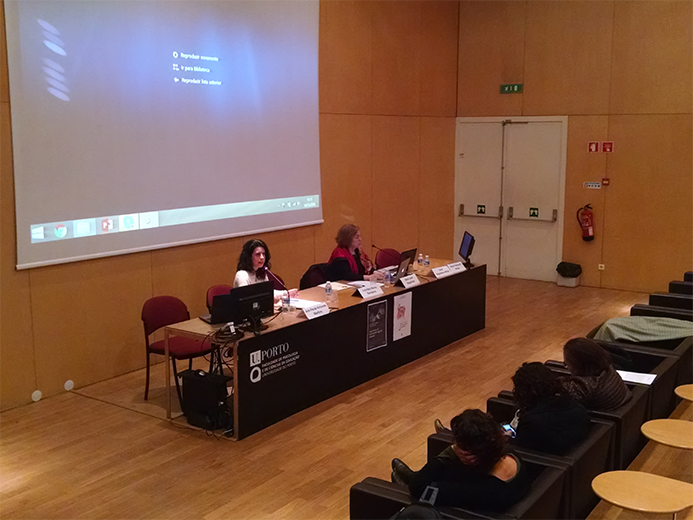
Ana Paula Antunes Martins e Maria José Magalhães during the debate
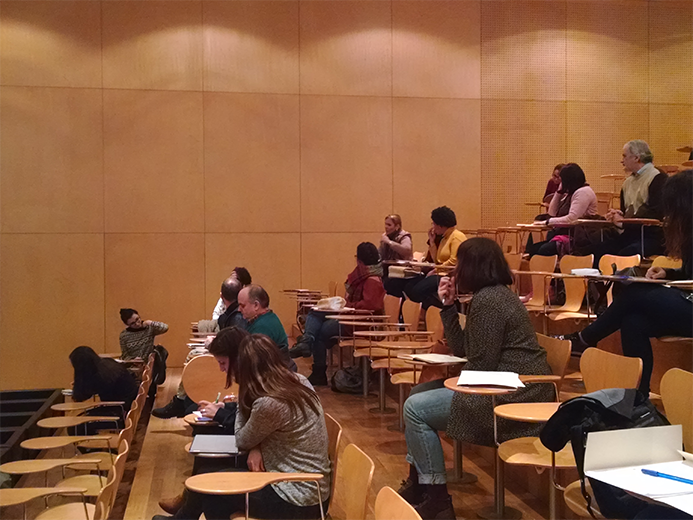
Audience of the seminar
Sendas/Paths from CEINAV exhibited at international festivals
The short animated film “Sendas/Paths”, directed by Raquel Felgueiras and produced in the scope of the project CEINAV – Cultural Encounters in Intervention Against Violence – and co-produced by Filmógrafo and Cine Clube de Avanca, has been awarded in the 20th edition of Avanca Film Festival with the prize “Avanca Competition – Short film”. The award ceremony took place on the 26th of July 2017 with the presence of Luís Chaby Vaz, President of ICA (Cinema and Audiovisual Institute).
The film has been selected for several national and international film festivals, from which we highlight Cinanima 2016, Sudan Independent Film Festival 2016, 10th International Children's Film Festival Bangladesh 2017, Curtas de Vila do Conde 2017 and Baixada Animada 2017, Brasil.
Sendas/Paths has also been screened in London with live music by the Anima Collective at St Alfege Church in 2016; at Maus Hábitos by the Porto Femme Sessions, 2017; and selected for: Festival Caminhos 2016 (Coimbra); Festival de Foz Côa 2016; Shelburne Falls Fabulous Fringe Fest, USA; 1+1Play 2016 (Coruña); SÃO TOMÉ FESTFILM'17; Shortcutz de Guimarães (2017); CINEMADAMARE 2017 (Italy); Festival PORTO7 (2017); Encontrarte Amares 2017; Festival NAU (Porto 2017); Future Film Festival 2017 (Italy).
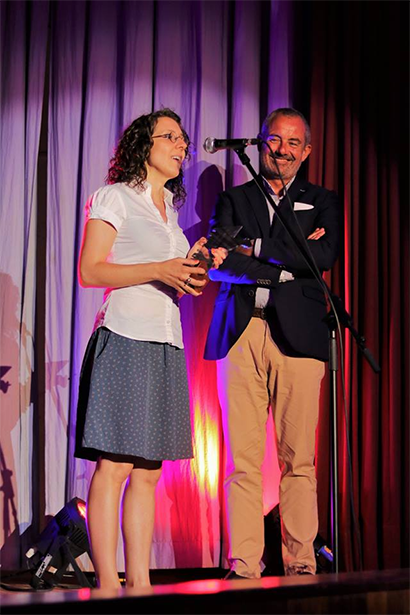
Raquel Felgueiras at the Avanca Film Festival award ceremony with Luís Chaby Vaz (President of ICA)
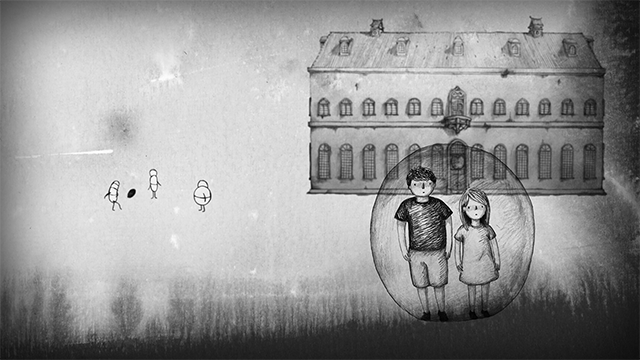
Still frame from the film “Sendas/Paths”
1st Visual Culture Encounter, Coimbra, November, 11th, 2015
The 1st Visual Culture Encounter dedicated to the theme “The share of the visible: gazing politics”, took place on the 11th of November. The event was held at the University of Coimbra, at “Casa das Caldeiras” and was organized by a recently formed Working Group on Visual Culture from the Portuguese Communication Association (PCA).
In the communication “Visual Narratives: the expression of intervention by women and youngsters victims of violence”, the CEINAV team presented the analysis of the visual narratives produced in a participatory art process. The presentation covered the following topics: introduction, methodology, ethical considerations, creative project's structure, results analysis and conclusion. The visual narratives analysis allowed us to identify three main categories: confinement, liberation and resignation. Image and interpretation were combined for a better understanding of the research that CEINAV is conducting.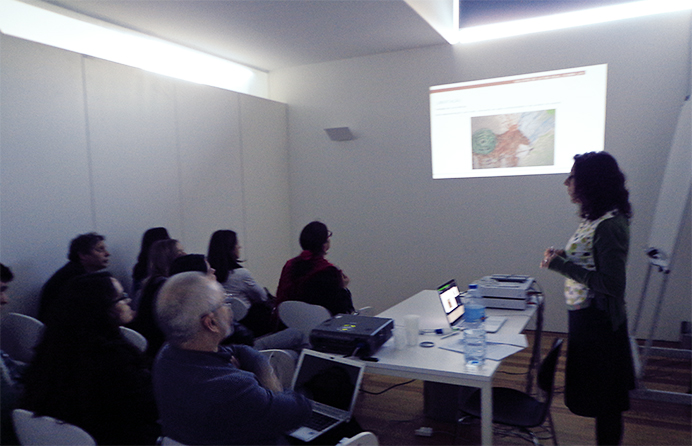
Workshop with Associate Partners - October 9th, 2015
On October 9th, 2015 we met with Associate Partners and discussed the project’s results so far. We talked about the comparative papers that have been written recently and the creative workshops that were developed in the four countries. We also brainstormed about the project’s final seminar, namely the organization of the talks. We also designated a provisional date for the event. Finally, we formalized the collaboration with the Association for Family Planning (APF), which has a specialized division that provides services to victims of human trafficking.

From left to right: Clara Sottomayor (Senior Researcher), Angélica Lima Cruz (Senior Researcher), Raquel Felgueiras (Artist-Researcher), Rita Lopez (Researcher), Ilda Afonso (Associate Partner - UMAR), Leonor Valente Monteiro (Associate Partner - APC), Fernanda Pinto (Associate Partner - APF), Rita Moreira (Associate Partner - APF), Maria José Magalhães (Principal Investigator).
International Workshop in
Bucharest on
Homicide:
Incidence, Risk Factors and Prevention
INSTITUTE OF SOCIOLOGY OF ROMANIAN ACADEMY, 24-5 September 2015
The international research workshop about incidence,
risk factors and prevention of homicide, in 24-25 of September, 2015, in Bucharest, in the Institute of Sociologia of Romanian Academy, was an opportunity to think about this lethal violence and its prevention.
Maria José Magalhães presented a paper about the
preliminary findings of the Project CEINAV with the title: “Homicide Across Frontiers: Lessons from a comparative approach to think about prevention”.
A variety of relevant contributions from diverse
fields of knowledge made possible a profound debate about the field: Ecaterina Balica (Institute of Sociology - Romanian Academy), Anna Constanza Baldry (Department of Psychology, Second University of Naples, Italy), Iulian Bocu (Chief Commissioner, Head of
Bucharest Homicide Unit), Adrian Jug?naru (Commissioner – Head of Bucharest Intelligence Analysis Unit), Marieke Liem (European Society of Criminology and Senior Researcher, Law Faculty, Leiden University, Netherlands), Consuelo Corradi (Professor of Sociology,
Lumsa University, Italy), Adrian Obad? (Chief inspector, Bucharest Homicide Unit, Romania), Carmen Vives Cases (Public Health Senior Lecturer, Alicante University and Vice-president of the Spanish Society of Epidemiology, Spain), Maria José Magalhães (Faculty
of Psychology and Sciences of Education, University of Porto, Portugal), Benjamin Kraus (Associate Researcher, German Police University, Muenster, Germany), Valentina Marinescu (Faculty of Sociology and Social Work, University of Bucharest, Romania), Angelica
Marinescu (Faculty of Journalism and Communication Sciences, University of Bucharest, Romania). [ See programme ].
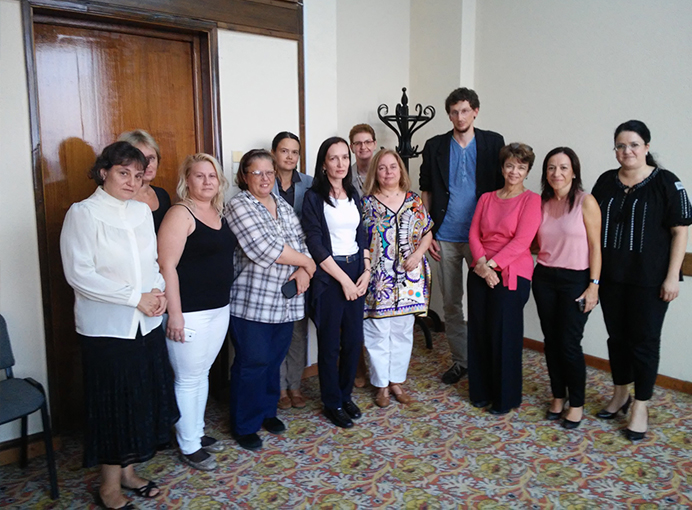
CEINAV Team Presents a Symposium at the European Conference on Domestic Violence
On September 8th 2015, representatives of the four CEINAV teams presented a symposium at the European Conference on Domestic Violence, held at Queen’s University Belfast, Northern Ireland. The symposium was entitled “Cultural Patterns in Intervention Against Violence” and consisted of four talks that presented the data gathered in each country about the professionals’ discourses regarding their interventions against violence. Prof. Liz Kelly opened the symposium with an overview of the entire CEINAV project, including its goals and methodology. She then presented the professionals’ discourses in the UK: “From private to public, need to risk, women to children: the changing professional discourse on domestic violence in the UK.” Prof. Rita Lopez then gave a presentation on the analysis conducted in Portugal entitled: “Cultural barriers to the protection of women and children against domestic violence: professionals’ discourses in Portugal.” This presentation was based on a paper with the same title written by the Portuguese team: Prof. Maria José Magalhães, Prof. Angélica Lima Cruz, Prof. Rita Lopez, Dr. Raquel Felgueiras and Dr. Vera Silva. Following, Dr. Bianca Grafe presented the German team’s data: “Framing intervention and handling difficult decisions in professional responses to domestic violence in Germany.” Finally, Prof. Vlasta Jalusic gave an account of the Slovenian Professionals’ discourses and closed with a few conclusions that emerged from the cross-country analysis of the professionals’ discourses. The researchers also responded to questions from the audience.
Below are two pictures of the CEINAV researchers attending the symposium: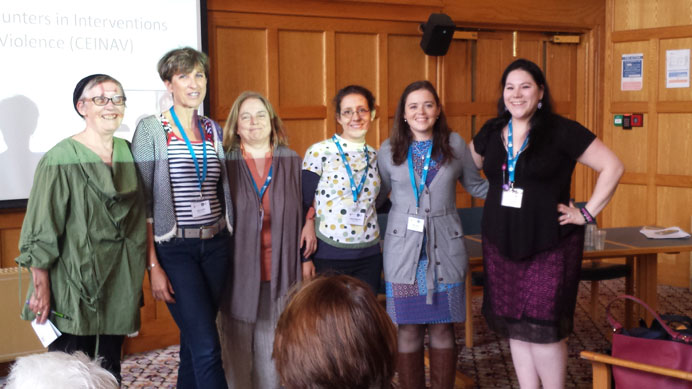
From left to right: Prof. Liz Kelly (PI - UK), Prof. Vlasta Jalusic (PI - Slovenia), Prof. Maria José Magalhães (PI - Portugal), Dr. Raquel Felgueiras (artist-researcher - Portugal), Prof. Rita Lopez (researcher – Portugal) and Dr. Bianca Grafe (researcher – Germany).
Meeting with the Team of the Project Ergue-te in Coimbra
On July 14th, we visited the team of the Ergue-te Project in Coimbra to introduce the project CEINAV and study ways to establish a colaboration. The Team of the Ergue-te project focuses on assisting women explored by prostitution or victims of other situations of violence promoting their liberation and dignification (www.erguete.pt). This project offers extensive services to this population, for instance, social and psychological support and counseling, legal aid, STD information and prevention, work orientation and re-integration, among others.

Meeting with the Associate Partners

Portuguese Research Team and Associate Partners: from left to right: Vera Silva, Ilda Afonso, Leonor Valente Monteiro, Clara Sottomayor, Angélica Lima Cruz, Rita Lopez, Raquel Felgueiras and Maria José Magalhães
Networking on Trafficking for Sexual Exploitation
Trafficking of human beings is a difficult field of intervention and very recent in Portugal (RCM nº 81/2007), where most of the known victims are for labour exploitation, therefore research struggles with many obstacles. In order to develop the CEINAV work the Portuguese team has a new associate partner: APF (Portuguese Family Planning Association - http://www.apf.pt/apf.php?lg=pt ; http://www.apf.pt/apf.php?lg=uk). This NGO is specialized in intervention in the field of trafficking of human beings and runs a shelter for women victims. Besides this NGO, CEINAV also keeps networking with CIG (Portuguese Commission For Citizenship and Gender Equality) where Manuel Albano acts as the National Rapporteur for trafficking.
To deepen some issues around trafficking for sexual exploitation, CEINAV met in Porto with CIG and APF, in the 8th of April, and discussed the following topics: assisted return, difficulties in the assignment of the victim status, access to health care by illegal immigrants and the difficulties in finding volunteers to be interviewed by the CEINAV project.
This meeting is part of a networking process which is highly relevant to an epistemological position linking research and practice in the field of human trafficking for sexual exploitation.
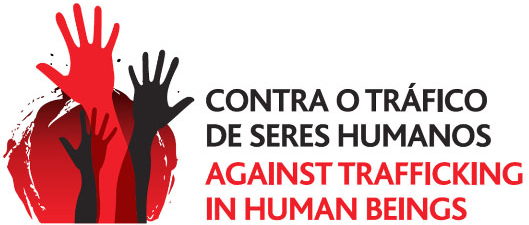
Public Presentation of CEINAV - October 1, 2014
Within the Porto Research Meeting, a Public Presentation of CEINAV was held in FPCEUP, with Prof. Fátima Machado, vice-rectoress of University of Porto, Prof. Emeritus Carol Hagemann-White, Project Leader CEINAV, and researcher in Department of Educational and Cultural Studies, University of Osnabruck, Germany, Prof. Doutora Liz Kelly, coordinator of research team in UK, researcher in London Metropolitan University, Prof. Vlasta Jalusic, coordinator of the Slovenian team and researcher in Peace Institut de Ljubliana, Eslovénia, Prof. Maria José Magalhães, national coordinator of CEINAV, researcher in FPCEUP, Thomas Myesen, coordinator of the research team of Heidelberg, researcher in German Institue for Youth and Human Sciences, and also Prof. António Magalhães, vice-president of Scientific Board of FPCEUP.
Meeting with Associate Partners, October 1 and 2, 2014
The 5 Days Seminar included a Meeting with the Associate partners, held on the 1st and 2nd of October, with representatives from BAWSO, Cardiff, and IMKAAN, from London, UK; Association for Non Violent Communication, from Ljubliana, Society KLJUC – Centre for fight against trafficking in human beings, Zdruzenje proti spolnemu zlorabljanju – Association against sexual abuse, from Slovenia; IGFH - Internationale Gesellschaft für erzieherische Hilfen, from Germany, Frauenhaus Koordinierung –Association of Womne’s Shelters, from Berlin, and KOK – Bundesweiter Koordinierungskreis gegen Frauenhandel und Gewalt an Frauen im Migrationsprozess, also from Berlin, Germany; and Associação Projeto Criar – Association against child abuse, from Porto, Portugal, and UMAR-Association of Women, Alternative and Answer, from Portugal.
In the meeting, researchers and representatives of the APs debated the preliminary results of the first stream of the research and their implications for next streams, in the pathway to understand the cultural premises in intervention.
Future directions of fruitful cooperation were built having in mind the artistic process that will go parallel with the next streams of the CEINAV research.
INTERVIEW WITH MANUEL ALBANO, RAPPORTEUR FOR HUMAN TRAFFICKING IN PORTUGAL
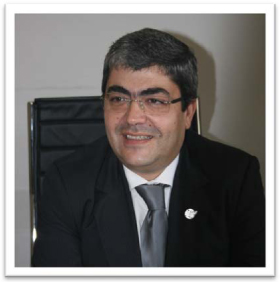 |
The Project CEINAV interviewed Dr. Manuel Albano, National Rapporteur for Human Trafficking, to acknowledge the recent historical, cultural and political trajectory of Portugal in this problematic. Manuel Albano, who is also the Delegate of the Commission for Citizenship and Gender Equality, in North of the country, introduced us to the main projects and protagonists in this area |